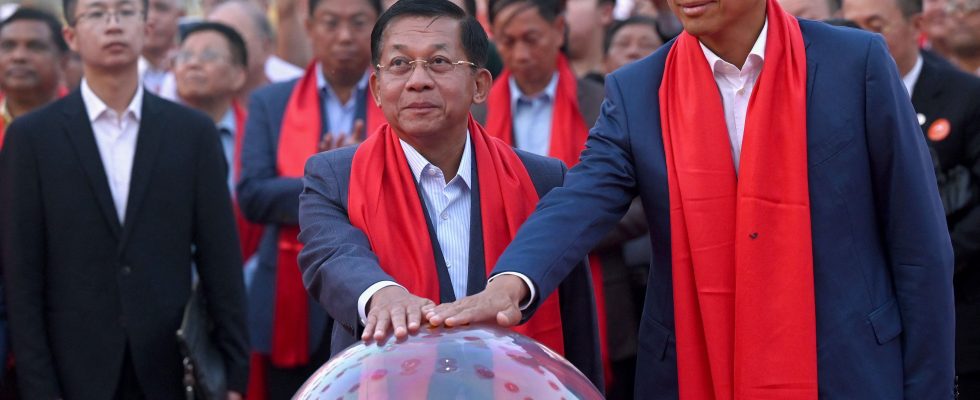A perfectly orchestrated communication operation. Last May, several hundred people participated in a “Myanmar – China Trade Fair” in a vast exhibition hall located in the heart of Naypyidaw, the strange capital of Burma (Myanmar) built in the middle of the jungle. “We have received export proposals to China, all of which will be beneficial to our farmers,” enthused one of the exhibitors, Ma May Zaw Khine, a coffee producer in Shan State, to the agency. New China. The objective of the military junta, in power since the February 2021 coup? Show the Chinese partner and the rest of the world that it has been able to preserve the economic environment in a country under fire and bloodshed.
However, less than 100 kilometers from the capital, to the east (Kayah State) as to the west (Magway region), the Burmese air force, under the pretext of fighting resistance groups, bombed villages, killing many civilians. Aircraft and ammunition being mainly supplied by Russia and China, for respective amounts – according to a United Nations report – of 400 and 260 million dollars since 2021.
Beijing double game
Very present, the second world economic power maintains ambivalent relations with Burma, with which it shares 2,129 kilometers of border. And which constitutes a fantastic reserve of natural resources (gas, jade, copper, rare metals, hydroelectricity…), but above all a vital artery of its new silk roads giving it access to the Indian Ocean.
Before the coup, despite a fairly shared anti-Chinese feeling among the population, China maintained honest relations with the democratically elected government of Aung San Suu Kyi. In 2018, Beijing consecrated with Naypyidaw the creation of a “China Myanmar economic corridor”, consisting, among other things, of road and rail networks and a deep-water port. These infrastructure projects were in addition to a 770 kilometer double pipeline intended to transport gas and oil from the Indian Ocean to the Sino-Burmese border.
After coldly welcoming the 2021 putsch, Beijing gave firm support to the military. But if this coup d’etat has the advantage for China of removing competition from Western investors forced, like Total, to leave the country, it also has undesirable effects. The reactivation of ethnic conflicts and the emergence of armed civil rebellions threaten Chinese investments. Some projects have been suspended, others placed under the control of the security forces.
China, in this double game that it has been practicing for a long time with the Burmese regimes, can however also count on several ethnic movements which, while fighting the junta, also depend on Beijing for its logistical support, including armament. Three of these groups announced that they would “take effective action against those who attempt to damage international investments”. Not sure that they will push back the new resistance movements which, on the strength of broad popular support, have already committed several sabotages, in particular against the pipeline, and threaten to attack the construction of a railway line if it it is reactivated.
Investments that complicate the return to democracy
The Chinese, who seem to be betting on the weakening of the protest, are nevertheless increasing their investments in local companies. And discussions on the revival of major works are at work. As for the double pipeline, it has been used since February 2023 to import Russian oil.
Anxious to extend their influence in the Indian Ocean, the communist regime has also, according to a Chatham House report, built military installations (including listening stations) on an island located in the south of Burma, close to the Andaman and Nicobar Islands, an Indian Territory.
Beijing’s current support for the military worries those who hope for a return to democratization in the country. “Chinese investments could be decisive in the junta’s attempts to legitimize its illegal and unpopular regime,” comments the China Global Newsletter. And to restore a “business routine” supposed to be exemplified by the May Fair in Naypyidaw and its coffee exporters.
